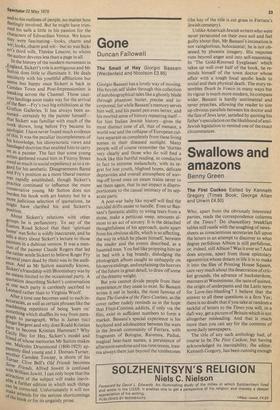Gone
Duncan Fallowell The Smell of Hay Giorgio Bassani (Weidenfeld and Nicolson £3.95)
Giorgio Bassani has a lovely way of moving. His boyish self slides through this collection of autobiographical tales like a ghostly blade through phantom butter, precise and incorporeal, for while Bassani's memory serves him well, and his pastel pen even better, and his morbid sense of history repeating itself— for him Italian Jewish history—gives the most distinct tone of all, that of menace, a world war and the collapse of European culture separate us completely from these living scenes in their diseased sunlight. Many people will of course remember the 'thirties very clearly and those who do will find a book like this hurtful reading, so conducive in fact to extreme melancholy, with its regret for lost youth, blighted hopes, delicate depravities and overall atmosphere of waving-off loved ones on steam trains never to see them again, that its net impact is disproportionate to the casual intimacy of its separate parts.
A post-war baby like myself will find the suicidal drifts easier to handle. Even so Bassani's fantastic ability to wring tears from a stone, make a petticoat weep, amounts almost to an act of sorcery. It is the detached thoughtfulness of his approach, quite apart from his obvious skills, which is so affecting, the way in which he places himself, between the reader and the events described, as a haunted man. You feel like propping him up in bed with a big brandy, dislodging the photograph album caught so unhappily on his nerve endings, and explaining the horrors of the future in great detail, to draw off some of the dreamy weight.
But you cannot divide people from their experience,or they cease to exist. So Bassani writes it out in books, the most famous of them The Garden of the Finzi-Continis, as the cover rather rudely reminds us in the hope that Finzi-Continis addicts, if only via the film, exist in sufficient numbers to form a market. Bassani's special experience is his boyhood and adolescence between the wars in the Jewish community of Ferrara, with fragments of Bologna, Ravenna, Padua, magical heat-haze names, a persistence of afternoon sunshine and tea-time tennis, trauma always there just beyond the tombstones
(the hay of the title is cut grass in Ferrara's Jewish cemetery).
Unlike American Jewish writers who were never persecuted on their own soil and feel guilty about that, Mr Bassani's intonation is not vainglorious, holocaustal; he is not obsessed, by phoenix imagery. His response runs beyond anger and into self-reasoning. In `The Gold-Rimmed Eyeglasses' which takes up well over half of the book, he reminds himself of the town doctor whose affair with a tough local apollo leads to social and then physical death. The story resembles Death In Venice in many ways but its vigour is much more modern, its compass wider. Bassani is hardly sentimental and never preaches, allowing the reader to size up obvious parallels between his doctor and the fate of Jews later, satisfied by quoting his father's speculation on the likelihood of antiJewish legislation to remind one of the exact circumstances.


































 Previous page
Previous page